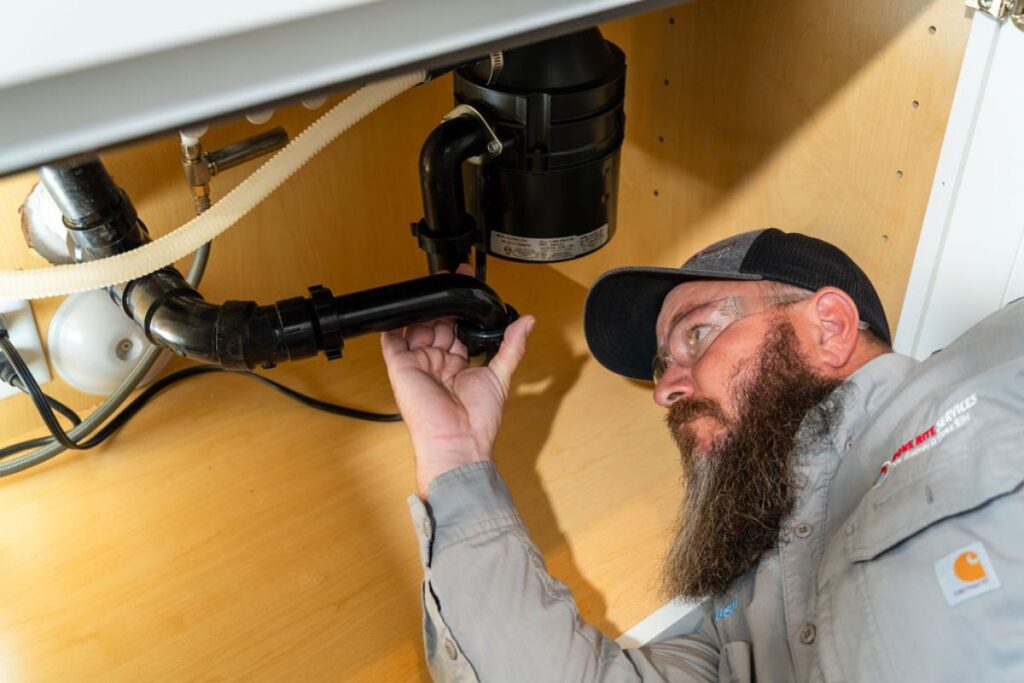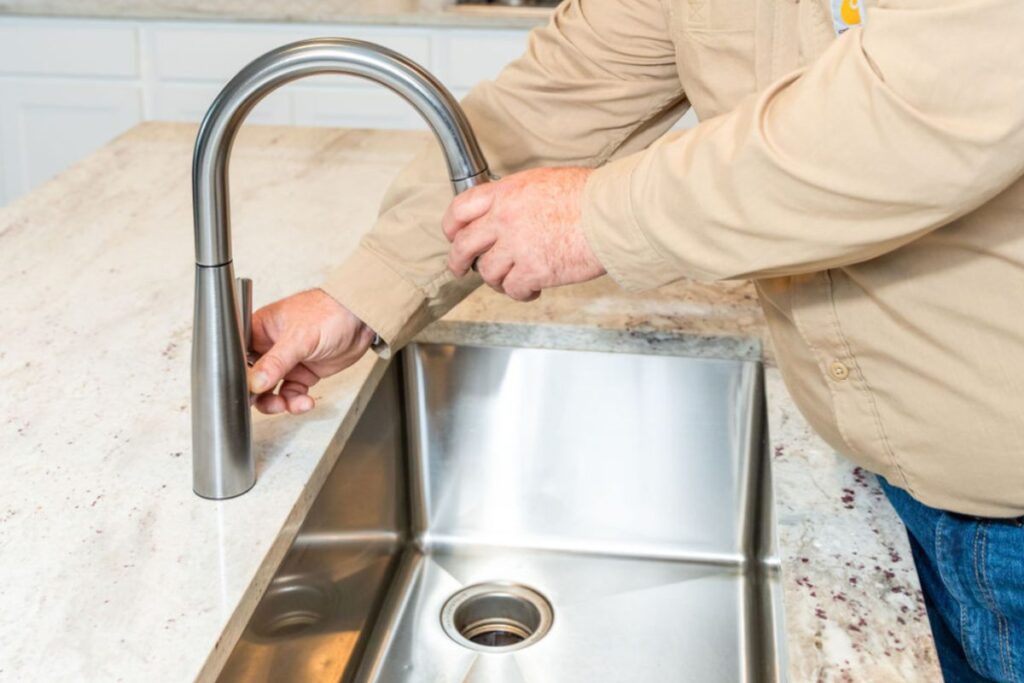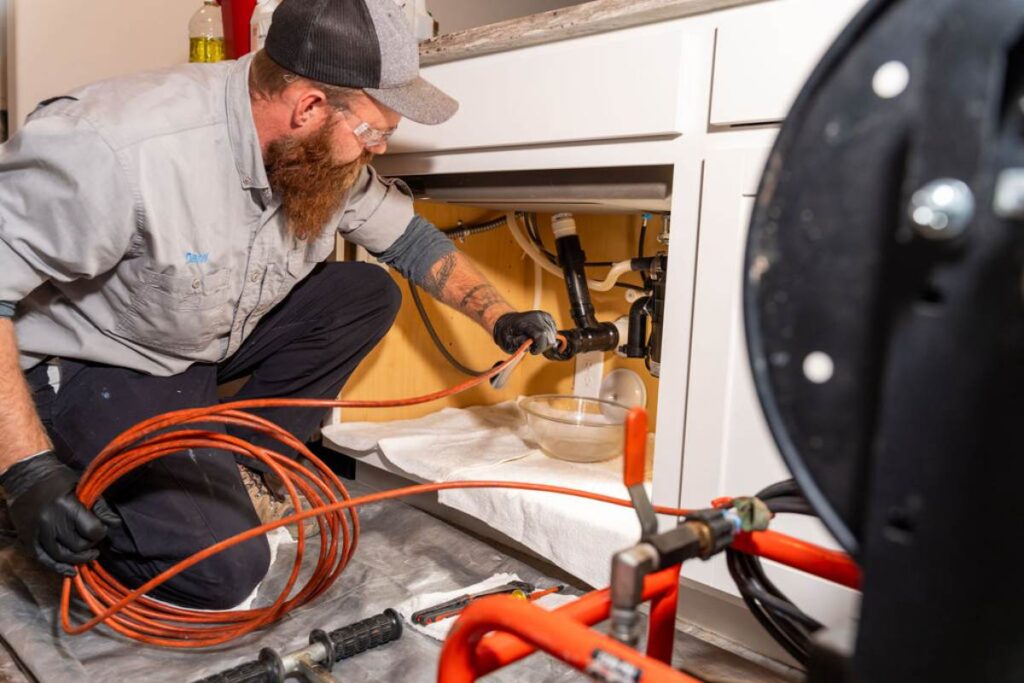
Key Takeaways
- Understanding the key components of kitchen plumbing—water supply lines, drain pipes, garbage disposals, and faucets—helps you maintain them properly.
- Common problems like clogged drains, low water pressure, and leaky faucets can be identified and fixed early to avoid bigger issues.
- Regular maintenance, such as checking for leaks and avoiding grease in the drain, helps prolong the life of your kitchen plumbing.
- Some plumbing repairs can be done yourself, but for more serious issues, always call a professional plumber.
- Prevent future problems by using appliances like garbage disposals properly and performing routine inspections.
The kitchen is the heart of the home, and one of its most essential yet often overlooked systems is the plumbing. From washing dishes to preparing meals, your kitchen’s plumbing plays a critical role in keeping things running smoothly. But do you really know how your kitchen’s plumbing works or what to look out for when things go wrong?
In this guide, we’ll explore the core components of your kitchen’s plumbing, how to maintain them, and what to do when problems arise. By the end of this article, you’ll have a deeper understanding of your kitchen plumbing and the confidence to know when it’s time to call a professional.
Table of Contents
Understanding Your Kitchen Plumbing System
Your kitchen’s plumbing involves several key components that work together to supply water, remove waste, and keep everything in working order. Here are the most important elements:
- Water supply lines: These pipes bring water to your kitchen, feeding into your faucet, dishwasher, and sometimes your refrigerator or other appliances.
- Drain pipes: After use, water flows through the drainpipes, connecting to the main sewer line or septic system. A well-functioning drain system ensures waste is carried away efficiently.
- Garbage disposal: Installed under your sink, this device grinds up food waste, preventing clogs in your pipes and helping to keep your kitchen clean and free of odors.
- Faucets and fixtures: The visible parts of your plumbing system, including your kitchen sink faucet and any other water outlets, provide you with access to hot and cold water. These can develop issues like leaks or low water pressure over time.
Maintaining these components is essential to avoid larger issues down the line. If you’re unsure whether your system is functioning optimally, a plumbing inspection is a great first step toward ensuring everything is working as it should.
Common Kitchen Plumbing Problems

Even the best-maintained kitchen plumbing systems can encounter problems over time. Knowing what to look for can help you prevent a minor issue from becoming a significant headache. Here are a few common kitchen plumbing problems:
- Clogged drains: Food particles, grease, and soap scum can build up in your kitchen sink, causing clogs. Regularly cleaning the drain or using a drain cover can help prevent this issue.
- Leaky faucets: A leaking kitchen faucet is more than an annoyance—it can waste significant amounts of water and lead to higher bills. If you notice a drip, it’s time to fix the issue or contact a professional plumber for leaky faucet repair service.
- Low water pressure: If your faucet isn’t delivering water at the usual speed, it could indicate a clog in the aerator or an issue with your water supply line.
- Garbage disposal issues: If your garbage disposal is making strange noises or isn’t grinding food efficiently, it might be time for maintenance or replacement.
If you’re experiencing any of these issues, seeking water leak detection or repair services can prevent further damage. Early intervention is crucial for keeping repair costs low and avoiding water damage.
Maintenance Tips for Your Kitchen Plumbing
A little regular maintenance can go a long way in keeping your kitchen plumbing in top condition. Here are a few simple but effective tips:
- Avoid pouring grease down the drain: Grease can solidify in your pipes, causing serious clogs. Dispose of it properly in the trash instead.
- Clean your garbage disposal: Running cold water while using the disposal helps keep it clear of food buildup. You can also grind ice cubes or citrus peels to freshen it up and remove debris.
- Check for leaks regularly: Inspect under your sink and around your faucets for signs of leaking. Even small drips can lead to bigger problems over time.
- Test your water pressure: Low water pressure can be a sign of a clog or a more serious issue with your pipes. Regularly testing your faucet’s pressure can help you catch problems early.
Routine maintenance helps extend the life of your plumbing and ensures that you won’t be dealing with more costly repairs later on. For an in-depth assessment, it’s worth scheduling a plumbing inspection with professionals to catch potential issues before they become emergencies.
DIY vs. Professional Kitchen Plumbing Repairs

There are some kitchen plumbing tasks you can handle yourself, but others require the expertise of a professional. Here’s a breakdown of what you can DIY and when it’s time to call a kitchen plumber:
- DIY fixes: Simple tasks like clearing minor clogs, replacing faucet aerators, or tightening connections can usually be handled by the homeowner. Keeping a plunger or a plumbing snake handy can be a big help for these minor issues.
- Call a professional: Major problems like serious clogs, broken pipes, or issues with your water lines are better left to the experts. For example, if you’re experiencing frequent clogs or noticing standing water under your sink, it’s time to search for a “kitchen plumber near me.” Plumbing systems are complex, and attempting repairs without the right expertise can lead to further damage or costly mistakes.
Remember, handling problems early on can prevent emergencies like burst pipes. If you’re ever unsure, especially in urgent situations, reach out to Done Rite Services for emergency plumbing services for quick and reliable help.
Preventing Future Kitchen Plumbing Problems
Preventing future problems is the best way to save money and keep your kitchen running smoothly. Here’s how you can safeguard your plumbing system:
- Use your garbage disposal correctly: Always run cold water when using the disposal, and avoid grinding fibrous materials, which can cause clogs.
- Don’t ignore small issues: A dripping faucet or slow drain might seem minor, but over time, these small issues can become major problems. Addressing them early on prevents bigger headaches.
- Monitor water pressure: Unusual pressure changes can indicate a problem with your water supply or pipes. Keep an eye on how quickly water flows from your faucet, and investigate any sudden changes.
- Upgrade aging fixtures: If your kitchen plumbing is old, it might be time for an upgrade. Newer plumbing fixtures are more efficient and less likely to develop leaks or other issues.
Investing in quality garbage disposals and regular plumbing inspections will also help prolong the life of your kitchen plumbing.
Conclusion
Your kitchen’s plumbing system is essential to the daily operation of your home. Understanding how it works and performing regular maintenance can help prevent issues and save you from costly repairs. By identifying common problems and knowing when to call a professional kitchen plumber, you can keep everything running smoothly. Whether you’re dealing with a leaky faucet or a clogged drain or just want to ensure your kitchen is in top shape, Done Rite Services is here to help.
For professional kitchen plumbing assistance, reach out to Done Rite Services for fast, reliable service. Contact us at 520-369-3966 or visit our website for more information on our plumbing services.
FAQs
How can I maintain my kitchen plumbing system?
You can maintain your kitchen plumbing by regularly cleaning your drains, checking for leaks, and ensuring your garbage disposal is used properly. Routine inspections by professionals also help prevent issues
When should I call a kitchen plumber?
Call a kitchen plumber when you notice serious clogs, frequent leaks, or low water pressure. If a DIY fix doesn’t resolve the issue or if you’re unsure of the problem, it’s best to call a professional.
What are the most common kitchen plumbing problems?
Clogged drains, leaky faucets, and low water pressure are the most common issues in kitchen plumbing. Addressing these problems early can prevent further damage.
Can I repair my kitchen plumbing myself?
Some repairs, like clearing minor clogs or fixing faucet aerators, can be done yourself. For more complex issues like pipe repairs or major leaks, it’s best to call a professional plumber to avoid costly mistakes.
